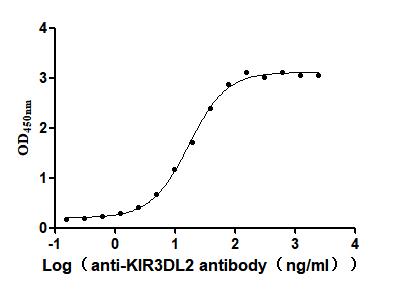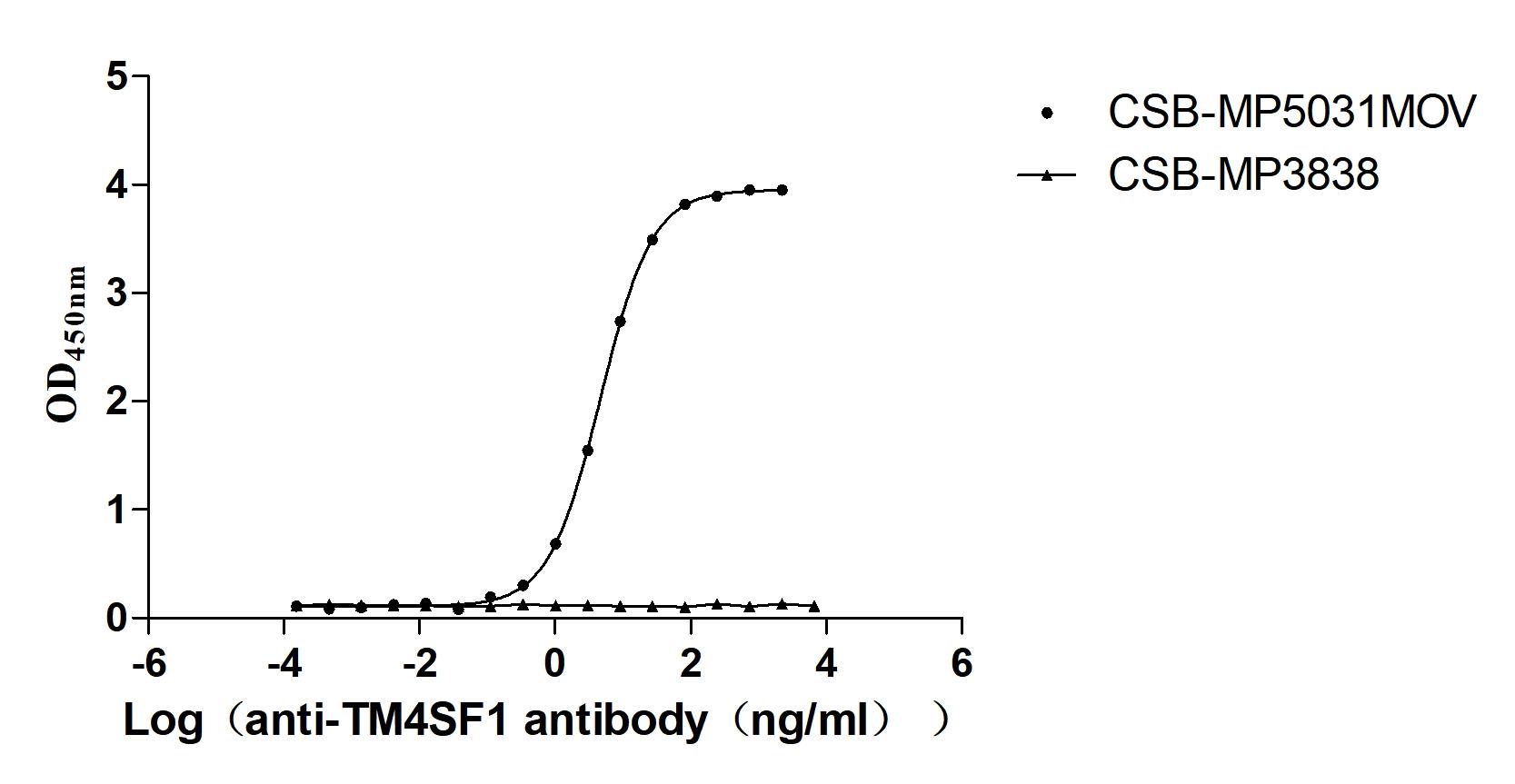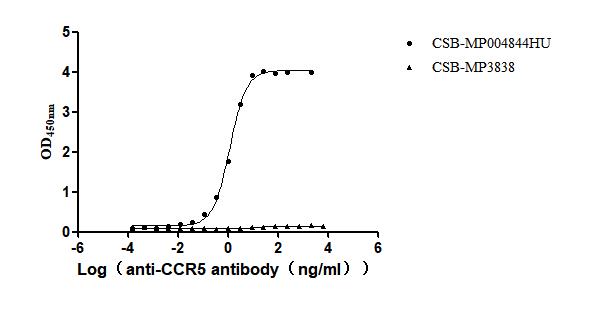Recombinant Mouse Sp110 nuclear body protein (Sp110)
-
货号:CSB-YP022440MO
-
规格:
-
来源:Yeast
-
其他:
-
货号:CSB-EP022440MO
-
规格:
-
来源:E.coli
-
其他:
-
货号:CSB-EP022440MO-B
-
规格:
-
来源:E.coli
-
共轭:Avi-tag Biotinylated
E. coli biotin ligase (BirA) is highly specific in covalently attaching biotin to the 15 amino acid AviTag peptide. This recombinant protein was biotinylated in vivo by AviTag-BirA technology, which method is BriA catalyzes amide linkage between the biotin and the specific lysine of the AviTag.
-
其他:
-
货号:CSB-BP022440MO
-
规格:
-
来源:Baculovirus
-
其他:
-
货号:CSB-MP022440MO
-
规格:
-
来源:Mammalian cell
-
其他:
产品详情
-
纯度:>85% (SDS-PAGE)
-
基因名:Sp110
-
Uniprot No.:
-
别名:Sp110; Ifi75; Ipr1; Sp110 nuclear body protein; Intracellular pathogen resistance protein 1
-
种属:Mus musculus (Mouse)
-
蛋白长度:full length protein
-
表达区域:1-445
-
氨基酸序列MFTLTKALEK ALLQHFIYMK VNIAYAINKP FPFFEALRDN SFITERMYKE SLEACQNLVP LSKVVHNILT SLEQTFHPSV LLTLFSKVNL REYPSLVAIF RSFRNVGYTY EEKNRPPLTL LEDLANPAEG CSLQTLLPPP RPQISLPSHL SSAPRVCDPR ATAQPIIEIL DEQPSPSPRA VPLLGCIQEG KTTPVSSRDH QRKDKEDSRE MPHSPSGPES VVKDDSPAAN DLEMAREVPC TPANKKARRK KRPNWSNSKR RRQKKKPRQD EMMGVASPGH GVQEKLKAVS RRTLWKDDSS TNVKEVTKTQ RTRMRRAQTS NSQEISKEAS KTSGRKRPST ARRTTQVPEK TKNDAVDFSP TLPVTCGKAK GTLFQEKLKQ GASKKCIQNE AGDWLTVKEF LNEGGRATSK DWKGVIRCNG ETLRHLEQKG LLFFTSKSKP QKKGA
-
蛋白标签:Tag type will be determined during the manufacturing process.
The tag type will be determined during production process. If you have specified tag type, please tell us and we will develop the specified tag preferentially. -
产品提供形式:Lyophilized powder
Note: We will preferentially ship the format that we have in stock, however, if you have any special requirement for the format, please remark your requirement when placing the order, we will prepare according to your demand. -
复溶:We recommend that this vial be briefly centrifuged prior to opening to bring the contents to the bottom. Please reconstitute protein in deionized sterile water to a concentration of 0.1-1.0 mg/mL.We recommend to add 5-50% of glycerol (final concentration) and aliquot for long-term storage at -20℃/-80℃. Our default final concentration of glycerol is 50%. Customers could use it as reference.
-
储存条件:Store at -20°C/-80°C upon receipt, aliquoting is necessary for mutiple use. Avoid repeated freeze-thaw cycles.
-
保质期:The shelf life is related to many factors, storage state, buffer ingredients, storage temperature and the stability of the protein itself.
Generally, the shelf life of liquid form is 6 months at -20°C/-80°C. The shelf life of lyophilized form is 12 months at -20°C/-80°C. -
货期:Delivery time may differ from different purchasing way or location, please kindly consult your local distributors for specific delivery time.Note: All of our proteins are default shipped with normal blue ice packs, if you request to ship with dry ice, please communicate with us in advance and extra fees will be charged.
-
注意事项:Repeated freezing and thawing is not recommended. Store working aliquots at 4°C for up to one week.
-
Datasheet :Please contact us to get it.
靶点详情
-
功能:May act as a transcription factor. Plays a role in the innate immunity against intracellular pathogens. Required for resistance to M.tuberculosis and L.monocytogenes. Promotes apoptosis of infected cells.
-
基因功能参考文献:
- mechanistic studies revealed that an arginine/lysine-rich element within the DNA-binding domain (SAND domain) is critical for Ipr1 binding to the importin protein receptor NPI-1, demonstrating that this element plays an essential role in mediating the nuclear localization of Ipr1 protein PMID: 27622275
- Using mouse models and genetic characteristics of human patients the role of SP110b was studied to determine its role in controlling host immunity and susceptibility to TB by modulating nuclear factor-kappaB (NF-kappaB) activity resulting in down regulation of TNF-alpha production and upregulation of NF-kappaB-induced antipoptotic gene expression suppressing IFN-gamma-mediated monocyte and/or macrophage cell death. PMID: 27858493
- These findings not only reveal the transcriptional basis of Sp110-mediated macrophage resistance to Mtb, but also suggest potential regulatory roles for Sp110 related to inflammatory responses, miRNA profiles, and the intracellular growth of Mtb. PMID: 26912204
- strain-specific promoter region polymorphism is associated with resistance to tuberculosis PMID: 26590945
- mediates RAW 264.7 macrophage cell line resistance to Mycobacterium bovis PMID: 21790702
- Ipr1 might be involved in apoptosis pathway via MYBBP1A. PMID: 20221700
- identification and analysis of the genes Sp100, Csprs, and Ifi75 in two members of the genus Mus, M. musculus and M. caroli PMID: 11471051
- data indicate that the Ipr1 gene product might have a previously undocumented function in integrating signals generated by intracellular pathogens with mechanisms controlling innate immunity, cell death and pathogenesis PMID: 15815631
显示更多
收起更多
-
相关疾病:Defects in Sp110 are a cause of severely impaired resistance to infection by M.tuberculosis.
-
亚细胞定位:Nucleus.
-
组织特异性:Detected in lung and macrophages.
-
数据库链接:
KEGG: mmu:109032
STRING: 10090.ENSMUSP00000091226
UniGene: Mm.335802
Most popular with customers
-
Recombinant Human ICOS ligand (ICOSLG), partial (Active)
Express system: Mammalian cell
Species: Homo sapiens (Human)
-
Recombinant Human Leukemia inhibitory factor (LIF) (Active)
Express system: Mammalian cell
Species: Homo sapiens (Human)
-
Recombinant Human Mucin-17 (MUC17), partial (Active)
Express system: Mammalian cell
Species: Homo sapiens (Human)
-
Express system: Mammalian cell
Species: Homo sapiens (Human)
-
Recombinant Human Claudin-6 (CLDN6)-VLPs, Fluorescent (Active)
Express system: Mammalian cell
Species: Homo sapiens (Human)
-
Recombinant Human Killer cell immunoglobulin-like receptor 3DL2 (KIR3DL2), partial (Active)
Express system: Mammalian cell
Species: Homo sapiens (Human)
-
Recombinant Macaca fascicularis Transmembrane 4 L6 family member 1 (TM4SF1)-VLPs (Active)
Express system: Mammalian cell
Species: Macaca fascicularis (Crab-eating macaque) (Cynomolgus monkey)
-
Recombinant Human C-C chemokine receptor type 5 (CCR5)-VLPs (Active)
Express system: Mammalian cell
Species: Homo sapiens (Human)


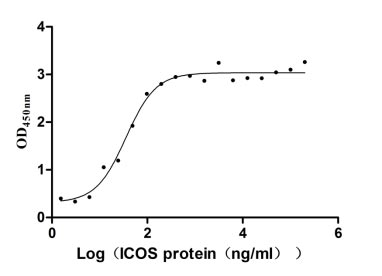
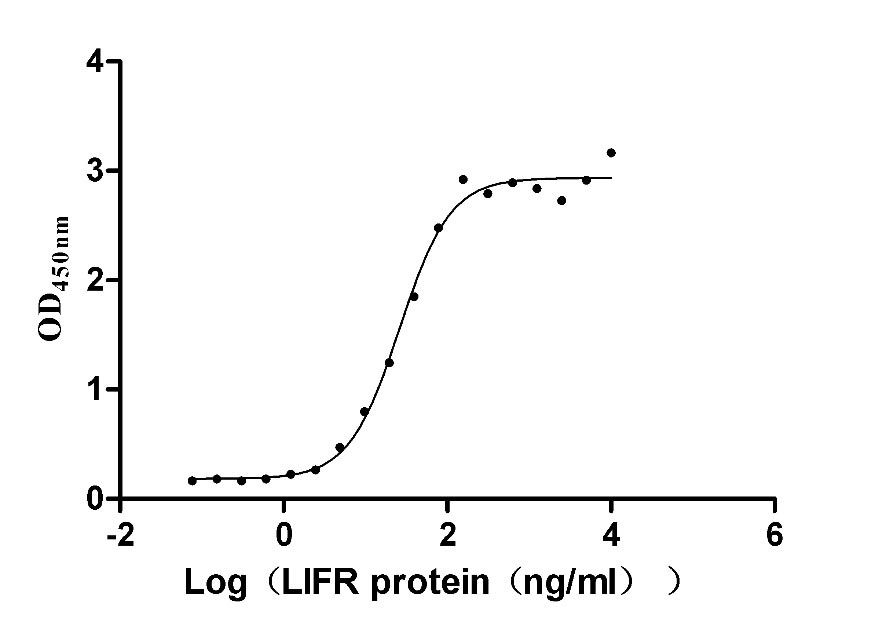
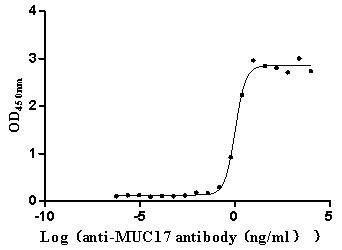
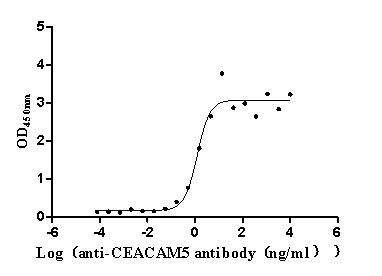
f4-AC1.jpg)
